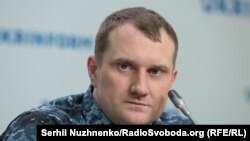When Russian coast-guard ships off the Crimean Peninsula opened fire on his ship, the Berdyansk, last November, Captain Denys Hrytsenko decided not to respond. It was a choice that plainly haunted the Ukrainian naval officer during his more than nine months in Russian captivity.
“Time has gone by. I’ve worked out this situation for myself,” he told a September 12 press conference in Kyiv. “God led me. We did what was necessary. If it had been otherwise, we wouldn’t be around anymore.”
On September 7, Russia exchanged Hrystenko and 34 other Ukrainian prisoners for 35 prisoners held by Ukraine.
Russian forces took Hrytsenko and 23 additional servicemen prisoner on November 25, 2018 as the Ukrainians’ three naval vessels attempted to enter the inland Sea of Azov, a body of water shared by Ukraine and Russia, from the Black Sea, off the Russian-annexed Crimean Peninsula. Ultimately placed in Moscow’s maximum-security Lefortovo detention center, the men faced six years in prison for allegedly violating the Russian border.
Hrytsenko and three other sailors -- Commander Oleh Melnychuk, Senior Master Andriy Oprysko, and Master Andriy Artemenko -- told reporters that they had expected a ruse by Russian forces on the Crimean Peninsula.
“We knew where we were going. They [the Ukrainian navy] warned us that various provocations could happen. I was ready for this,” Hrystenko said.
Repeating Kyiv’s earlier assertions, he claimed that he had contacted Russian border guards with his planned route four hours before the clash and received confirmation that the Ukrainian ships’ coordinates were registered. Russia, by contrast, claims that the Ukrainian ships’ crew ignored the Russian border guards’ communications and gave no prior notice about their itinerary. It alleges that it had no choice but to open fire.
Russian forces first placed the 24 captured Ukrainian sailors and cadets in a detention center in Crimea, then in Moscow’s Lefortovo pretrial detention facility.
Once in Lefortovo, Hrystenko alleged, the psychological pressure began. “They took out the guys one by one and said, ‘They’ve sent you off to be slaughtered.’ Psychologists were working, putting pressure on us; also, lawyers, who advised us to fall on our knees before the judge, kiss [his or her] robe, admit our guilt and, then, everything will be somehow better for you.”
In Lefortovo, a former KGB prison known for its harsh conditions, the sailors lived in “complete isolation,” without access to phone calls, Hrytsenko said. The letters that reached the group and schoolchildren’s handicrafts, passed on by Ukraine’s consul in Moscow, proved invaluable morale boosters, he added, expressing thanks for the deliveries.
Upon their return to Ukraine on September 7, the servicemen were admitted for treatment at Kyiv’s main military hospital. None of the group plans to leave the navy, according to Hrytsenko.
The Ukrainian government has promised to give them apartments in their Black Sea home base of Odesa within three weeks, he said.
Current Time TV's Broadcast Of Ukrainian Sailors' September 12, 2019 Press Conference (In Russian)





Facebook Forum